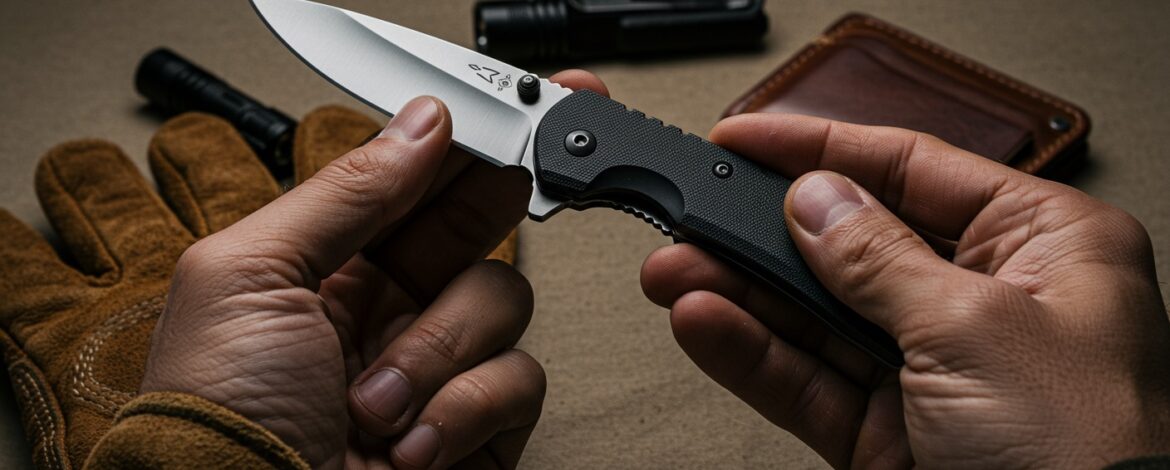South Africa’s knife laws are notably more permissive than those in countries like the United Kingdom, yet they remain frustratingly vague in practice. Unlike pepper spray, which has clear legal standing, knives fall into a grey area governed by the Dangerous Weapons Act 15 of 2013. Understanding these context-sensitive regulations is crucial for anyone carrying a knife for everyday use, outdoor activities, or self-defence.
No Specific Knife Restrictions: The Legal Framework
South Africa has no specific legislation dedicated solely to knives. There are no absolute prohibitions on blade length, opening mechanism, or knife type—unlike jurisdictions that ban switchblades, gravity knives, or fixed blades outright. This absence of knife-specific laws means you won’t find clear guidelines stating that folding knives under a certain length are automatically legal while longer blades are banned.
Instead, knives are governed by the Dangerous Weapons Act, which defines a dangerous weapon as any object, other than a firearm, capable of causing death or inflicting serious bodily harm if used for an unlawful purpose. This broad definition encompasses knives of all types: folders, fixed blades, multitools, machetes, swords, daggers, switchblades, and even improvised weapons like sharpened screwdrivers.
The critical phrase is “if used for an unlawful purpose.” A knife becomes a dangerous weapon only when circumstances suggest you intend to use it unlawfully. This context-dependent approach gives police considerable discretion in determining whether your knife possession is legal.
The 10cm Myth and Police Discretion
You’ll frequently encounter the claim that folding knives with blades under 10cm are legal. This originated from a comment by Police Superintendent Jay Naicker stating that knives should not exceed 10cm to be considered legal. However, this guideline isn’t codified in the Dangerous Weapons Act and should be taken with substantial caution.
No blade length limit appears in the legislation. The 10cm benchmark reflects police interpretation rather than statutory law. While carrying a small folding knife is less likely to attract police attention than a large fixed blade, the law ultimately assesses your circumstances rather than blade measurements.
Police exercise discretion based on multiple factors: time and place of possession, your behaviour, how you carry or display the knife, and whether possession relates to criminal activity. Carrying a tactical knife clipped to your belt in a shopping mall will raise more suspicion than carrying the same knife while camping in Kruger National Park. Context determines legality.
Lawful Purposes: When You Can Carry Any Knife
The Dangerous Weapons Act exempts possession of dangerous weapons in specific circumstances, making it legal to carry knives of any blade length when the circumstances justify it. These exemptions include possession in pursuit of lawful employment, duty, or activity; during participation in religious or cultural activities; for lawful sport, recreation, or entertainment; and for legitimate collection, display, or exhibition.
If you’re a butcher carrying your knives to work, a game ranger with a fixed blade in the bush, or a fisherman with a fillet knife at the coast, your possession is clearly lawful. Hunters, hikers, and campers carrying appropriate knives for outdoor activities fall under the sport and recreation exemption. Cultural weapons like traditional Zulu spears and knobkerries enjoy explicit protection during ceremonies.
The challenge arises with everyday carry in urban environments. Can you justify carrying a folding knife for general utility purposes in Cape Town? While the Act permits possession for lawful activities, police may question whether EDC constitutes sufficient justification depending on the knife type and your specific circumstances.
Prohibited Carry Situations
Regardless of lawful purpose, carrying any dangerous weapon to a gathering, demonstration, or protest is absolutely prohibited under amendments to the Regulation of Gatherings Act. This reflects constitutional protections for the right to assemble peacefully and unarmed. Even if you have legitimate reasons to carry a knife elsewhere, bringing it to a public demonstration constitutes a criminal offence.
Carrying knives in schools or other designated sensitive areas may also violate specific regulations. Additionally, if your manner of carrying the knife—openly displayed in a threatening way, concealed with no apparent legitimate purpose, or combined with intimidating behaviour—raises reasonable suspicion of unlawful intent, you’ve crossed into illegal territory.
Practical EDC Advice for South Africans
For everyday carry in cities, smaller folding knives with pocket clips are your safest option. A discreet multitool like a Leatherman or a traditional folder under 10cm blade length will rarely attract unwanted attention. Avoid tactical-looking knives, fixed blades, and anything resembling combat weapons when in urban areas without clear justification.
Save larger fixed blades for appropriate contexts: outdoor activities, camping trips, hunting, or specific work requirements. Game parks, hiking trails, and rural areas provide obvious justification for substantial knives. In cities, keep fixed blades secured in your vehicle or bag rather than openly displayed on your belt.
If stopped by police, your attitude and explanation matter immensely. Calmly explain your lawful purpose: you’re heading to a camping trip, using it as a work tool, or carrying it for general utility. Aggressive behaviour, evasive answers, or inability to articulate legitimate purpose will work against you.
The Dangerous Weapons Act carries penalties of a fine or imprisonment for up to three years. While police discretion means most lawful knife carriers won’t face arrest, understanding the context-sensitive nature of these laws helps you make informed decisions about what to carry and where.
South Africa’s knife laws ultimately balance personal freedom with public safety, relying on reasonableness and context rather than arbitrary restrictions. Carry appropriately for your circumstances, and you’ll navigate these grey areas successfully.

